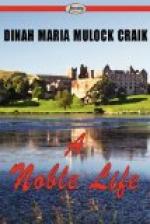“You can not go home,” said the earl to Mrs. Bruce, who remained with him, the minister having departed with his son Duncan early in the evening. “Stay here till to-morrow. Cardross, persuade your mother. You never yet spent a night under my roof. Helen, will you do it his once? I shall never ask you again.”
There was an earnest entreaty in his manner which Helen could not resist; and hardly knowing why she did it, she consented. Her son went off to his bed, fairly worn out with pleasurable excitement, and she staid with Lord Cairnforth, as he seemed to wish, for another half hour. They sat by the library fire, listening to the rain beating and the wind howling—not continuously, but coming and going in frantic blasts, which seemed like the voices of living creatures borne on its wings.
“Do you mind, Helen, it was just such a night as this when Mr. Menteith died, before I went to Edinburg? The sort of wind that, they say, is always sent to call away souls. I know not why it is, or why there should be any connection between things material and immaterial, comprehensible and wholly incomprehensible, but I often sit here and fancy I should like my soul to be called away in just such a tempest as this—to be set free,
“’And on the wings of
mighty winds
Go flying all abroad,’
“As the psalm has it. It would be glorious—glorious! Suddenly to find one’s self strong, active—cumbered with no burden of a body— to be all spirit, and spirit only.”
As the earl spoke, his whole face, withered and worn as it was, lighted up and glowed, Helen thought, almost like what one could imagine a disembodied soul.
She answered nothing, for she could find nothing to say. Her quiet, simple faith was almost frightened at the passionate intensity of his, and the nearness with which he seemed to realize the unseen world.
“I wonder,” he said again—“I sometimes sit for hours wondering— what the other life is like—the life of which we know nothing, yet which may be so near to us all. I often find myself planning about it in a wild, vague way, what I am to do in it—what God will permit me to do—and to be. Surely something more than He ever permitted here.”
“I believe that,” said Helen. And after her habit of bringing all things to the one test and the one teaching, she reminded him of the parable of the talents: “I think,” she added, “that you will be one of those whom, in requital for having made the most of all his gifts here, He will make ‘ruler over ten cities’ at least, if he is a just God.”
“He is a just God. In my worst trials I have never doubted that,” replied Lord Cairnforth, solemnly. And then he repeated those words of St. Paul, to which many an agonized doubter has clung, as being the last refuge of sorrow—the only key to mysteries which sometime shake the firmest faith—“’For now we see through a glass darkly, but then face to face; now I know in part, but then shall I know even as also I am known.’”




